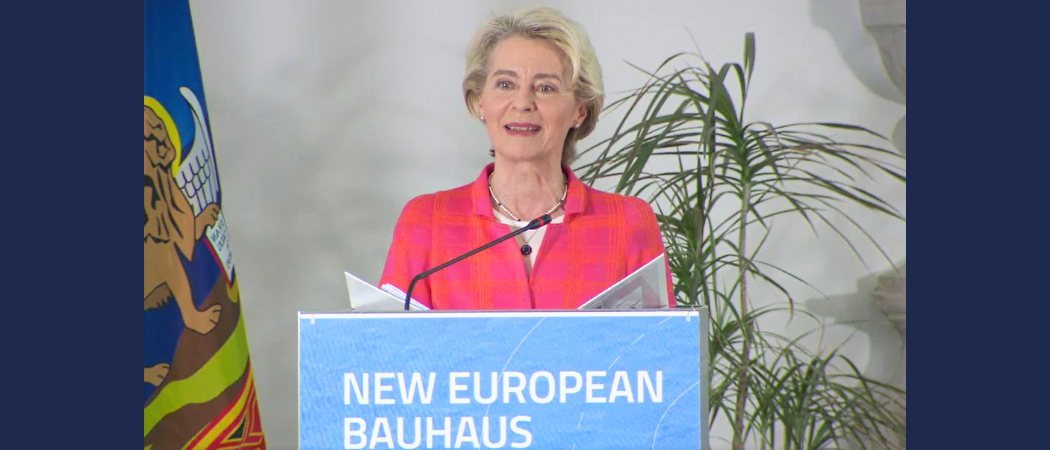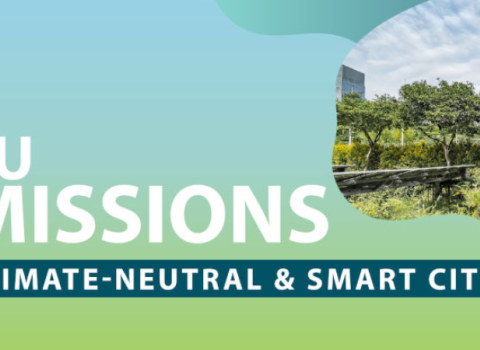Member states aren’t convinced that giving the project Mission status is the best way to ‘green’ neighbourhoods and bring Europe’s architectural and cultural heritage into the net-zero era

European Commission President Ursula von der Leyen first announced the New European Bauhaus initiative in 2021. Photo: European Union
EU member states aren’t sold on the European Commission’s idea of turning the New European Bauhaus into a Horizon Europe Mission, several EU diplomats have told Science|Business.
The Bauhaus initiative is the Commission president Ursula von der Leyen’s pet project that promises to put a cultural and aesthetic spin on the EU’s net-zero ambitions. It kicked off in 2020 as a Commission-led ‘movement’ of artists and innovators rethinking public, private and work spaces, but is now looking for a home within a single EU programme to give it a clearer framework.
When von der Leyen first announced it in 2021, many were sceptical about the idea, but with the president’s support the initiative attracted attention. To date Bauhaus has had funding from nine separate EU programmes. But in July, the Commission proposed the New European Bauhaus should become a dedicated Horizon Europe Mission - a novel and as yet unproven type of European research funding.
The proposed marriage of two new Commission schemes hasn’t convinced the member states, which have to put their seal of approval on the proposal in the Strategic Programme Committee, where member state delegates and the Commission meet to discuss the ins and out of EU’s framework programmes.
Legal questions
The jury is now out on whether the new Mission will see the light of day, with member state delegates raising legal questions ahead of a foreseen vote in mid-December.
They like the idea of New European Bauhaus and don’t mind Green Deal-related Horizon Europe money going to the project, which for some managed has to prove itself in the last couple of years. In fact, the Bauhaus project has already received funding from Horizon Europe without much backlash.
But the delegates are not sold on the effectiveness of the Missions, in which Horizon Europe has invested €1.8 billion thus far. The aim is to funnel research funding into demonstrator projects and other actions, which in turn will promote innovation and leverage in external funding in the five selected areas: cancer, climate adaptation, oceans and rivers, soil and climate-neutral cities.
An assessment published by the Commission in July showed the Missions are slowly delivering on their promises, but are still failing to attract much-needed political and financial backing from elsewhere.
It’s not a ringing endorsement and last year, EU ministers published joint conclusions instructing the Commission not to propose any new Missions “until current Missions have been positively assessed.”
In addition, member states think the proposal to turn the Bauhaus project into a Mission isn’t legally sound. That is because the Horizon Europe regulation sets out five areas in which the Commission can propose Missions, each of which gets a Mission board. Bauhaus cuts across the five Missions areas, though it does have an especially strong anchoring in the Mission aiming to help 100 cities transition to climate neutrality. But the Commission says Bauhaus needs a new board, for which it launched a call back in July. The delegates say technically the Horizon Europe regulation does not allow for any more than five boards.
The Commission isn’t accepting this argument yet, but insiders say it is more willing to listen to alternatives proposed by the member states. What these alternatives are remains to be seen.
Possible problem for Horizon Europe
If the legal challenge falls through, the decision on the Mission will go to a vote at the Strategic Programme Committee in December, where it’s likely to get voted down by member states. While some are in support, many don’t want to see this Mission launch.
There is a danger that this vote will be packaged with the vote on the Horizon Europe strategic programme, which will inform the direction of the second half of EU research programme from 2025 to 2027. If it gets voted down, this could hold back the adoption of the programme.
But the threat of a delay may not be as big as it sounds. Next year, a new Commission will come into power, freezing the work of the committee in the interim, and meaning some delay to the Horizon Europe plans for 2025 is inevitable either way.
It’s also possible that the vote on turning the Bauhaus project into a Mission will be averted: on Thursday morning, the Commission called an ad hoc Strategic Programme Committee meeting on the New European Bauhaus for 13 November.
Ministers keeping silent
As the Strategic Programme Committee debates the proposal at implementation level, the Council of member states, responsible for policy, is watching it all unfold. There’s resistance to the new Mission there too, but it’s choosing to remain silent on the matter.
The proposal to turn the Bauhaus project into a Mission was an add-on to the Commission’s communication on the assessment of the first few years of the Missions. A Commission communication usually calls for an EU Council conclusion, in which member states publish a joint opinion.
A day after the proposal for the Bauhaus Mission was put on the table, the EU Council’s research working party had a discussion about it. The feedback was all rather negative, according to insiders.
After the summer holidays, the working party gave the discussion another go. Most member states were against the Mission, but in support of the New European Bauhaus. One thing was clear: there won’t be unanimity, without which an EU Council conclusion cannot be adopted. To save themselves a headache, the Council decided against joint conclusions – a message of disapproval in itself.
But some say the Council could still weigh in: if the discussions at the Strategic Programme Committee play out badly, the Council might have to take charge again.





 A unique international forum for public research organisations and companies to connect their external engagement with strategic interests around their R&D system.
A unique international forum for public research organisations and companies to connect their external engagement with strategic interests around their R&D system.